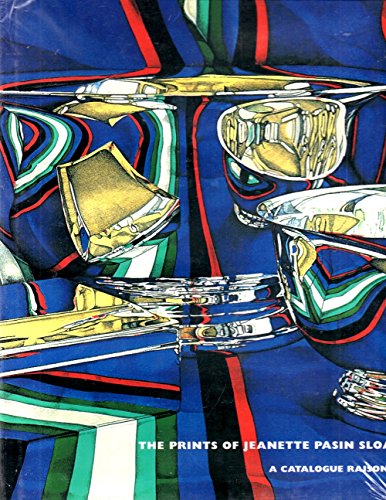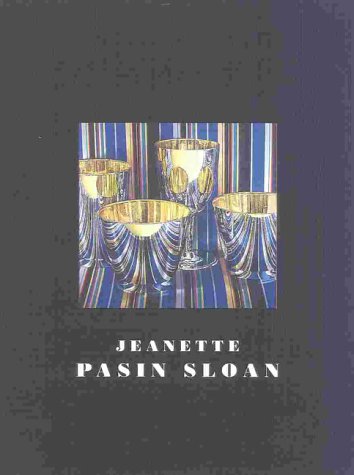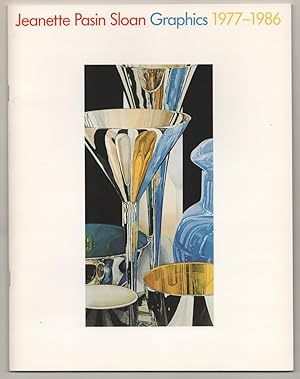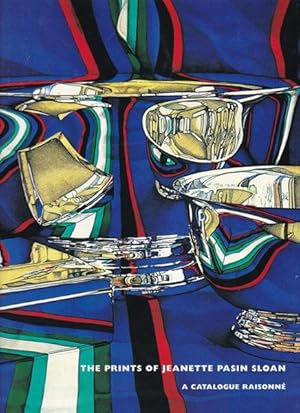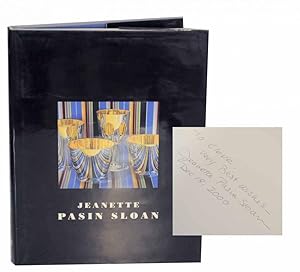sloan jeanette (38 risultati)
Tipo di articolo
- Tutti gli articoli
- Libri (37)
- Riviste e Giornali (1)
- Fumetti
- Spartiti
- Arte, Stampe e Poster
- Fotografie
- Mappe
-
Manoscritti e
Collezionismo cartaceo
Condizioni
Legatura
Ulteriori caratteristiche
- Prima edizione (16)
- Copia autografata (4)
- Sovraccoperta (17)
- Con foto (11)
- No print on demand
Spedizione gratuita
Paese del venditore
Valutazione venditore
-
Jeanette Pasin Sloan. June 2-June 30, 1995. Tatistcheff. New York. Los Angeles.
Editore: Tatistcheff & Company, Inc., 1995
Da: Zubal-Books, Since 1961, Cleveland, OH, U.S.A.
Condizione: Very Good. *Price HAS BEEN REDUCED by 10% until Monday, April 29 (sale item)* Approximately 8 pp., Paperback, covers lightly worn, else very good. - If you are reading this, this item is actually (physically) in our stock and ready for shipment once ordered. We are not bookjackers. Buyer is responsible for any additional duties, taxes, or fees required by recipient's country.
-
Jeanette Pasin Sloan: Watercolors (November 9-December 9, 1989)
Editore: Tatistcheff Gallery, Inc, 1989
Prima edizione
Trade Paperback. Condizione: Very Good. No Jacket. First Edition. 12mo - over 6¾" - 7¾" tall. A very good+ copy with minor creasing to rear wrapper; light bumping to corners.[4] pages (including wrappers:unpaginated). Gallery brochure issued in conjunction with the exhibition held November 9 to December 9, 1989 at the Tatistcheff Gallery in Santa Monica. Uncommon.1 Color Illustration.
-
Knit 2 Socks in 1 : Discover the Easy Magic of Turning One Long Sock into a Pair!: Choose from 21 Original Designs, in All Sizes
Editore: Storey Publishing, LLC, 2022
ISBN 10: 1635864070ISBN 13: 9781635864076
Da: GreatBookPrices, Columbia, MD, U.S.A.
Libro
Condizione: New.
Ulteriori offerte da altri venditori AbeBooks
Nuovo - A partire da EUR 11,43
Usato - A partire da EUR 12,11
Scopri anche Rilegato
-
Jeanette Pasin Sloan
Editore: Roger Ramsay Gallery, 1992
ISBN 10: 096134492XISBN 13: 9780961344924
Da: ANARTIST, New York, NY, U.S.A.
Libro
Softcover, staple-bound, 20 pages, very good condition, clean and crisp; no internal marks.
Ulteriori offerte da altri venditori AbeBooks
Usato - A partire da EUR 9,63
-
Prints of Jeanette Pasin Sloan: A Catalogue Raisonne
Editore: John Szoke, 2002
ISBN 10: 0936598093ISBN 13: 9780936598093
Da: Strand Book Store, ABAA, New York, NY, U.S.A.
Libro
Oversized Hardcover. Condizione: Good.
Ulteriori offerte da altri venditori AbeBooks
Nuovo - A partire da EUR 66,79
Usato - A partire da EUR 7,66
Scopri anche Rilegato Prima edizione
-
Jeanette Pasin Sloane
Editore: Ramsay Gallery, New York, 1992
Da: Ann Becker, Houston, TX, U.S.A.
Rivista / Giornale
Magazine. Condizione: Good. Condizione sovraccoperta: No Dust Jacket.
-
The Prints of Jeanette Pasin Sloan: A Catalogue Raisonné
Editore: John Szoke Editions, 2002
ISBN 10: 0936598093ISBN 13: 9780936598093
Da: Martin Nevers- used & rare books, Oxford, FL, U.S.A.
Membro dell'associazione: FABA
Libro Prima edizione
Hardcover. Condizione: Fine. Condizione sovraccoperta: Very Good. 1st Edition. Black binding with silver lettering on spine. Color plates throughout the book. Dust Jacket has some wear at corner tips and spine end. Photos of book on request.
-
Jeanette Pasin Sloan
Editore: Hudson Hills Pr, Manchester, Vermont, 2000
ISBN 10: 1555951899ISBN 13: 9781555951894
Da: A Good Read, Toronto, ON, Canada
Libro Prima edizione
Hardcover. Condizione: Fine. Condizione sovraccoperta: Very Good. First Edition. A Good Read ships from Toronto and Niagara Falls, NY - customers outside of North America please allow two to three weeks for delivery. Rubbing on d/j. Heavy/oversize item - additional shipping charges may be required depending on speed/destination requested. ; Folio.
Ulteriori offerte da altri venditori AbeBooks
Usato - A partire da EUR 17,32
Scopri anche Prima edizione Copia autografata
-
Jeanette Pasin Sloan: Graphics, 1977 - 1986
Editore: Landfall Press, Chicago, IL, 1986
Da: Jeff Hirsch Books, ABAA, Wadsworth, IL, U.S.A.
Prima edizione
First edition. Softcover. 24 pages. Features an introduction by Esther Sparks. Includes 18 color and black and white illustrations, a black and white photograph of the artist, a text by her, biographical information, list of previous exhibitions, and a bibliography. A fine copy in stapled wrappers. Uncommon.
-
Yesterday, or Long Ago - Poems by Wiley Clements
Editore: Clock & Rose Press, Harwich Port, 2004
ISBN 10: 1593860242ISBN 13: 9781593860240
Da: Rose's Books IOBA, Harwich Port, MA, U.S.A.
Membro dell'associazione: IOBA
Libro Prima edizione
Hardcover. Condizione: New. Condizione sovraccoperta: New. Campbell, Jeanette Sloan (illustratore). First Edition. First trade edition, preceded by a limited, numbered & signed edition of 125 copies. Cloth binding, 93 pp. James Wiley Clements, although he would deny it, stands as a remnant of a transitory time in the evolution of our consciousness as a people. This is a man who stood with Douglas MacArthur on the bridge of his flagship at Inchon, Korea, when to be an American was to stand for bravery, strength, and compassion- virtues we seem to have lost sight of now. Born in 1928 and raised by his grandmother on a one-mule farm in rural Alabama, the product of a fundamentalist Christian upbringing, he made the transition into a world larger than any he could have envisioned as a child. It is his (and our) gift that he observed the details of this passage so well and for so long. These poems, his first published book, preserve a perspective both wry and gentle that is almost extinct in American letters. These are immensely appealing poems: sometimes caustic, sometimes pensive, always alive with a vivid undercurrent of humor and compassion. He speaks to the Confederate dead, whose dying world shaped his early days. He speaks to the grace and humility that lives in all of us, urging, in his understated manner, a return to the roots of our national humanity before it withers away entirely. Wiley would say these are the simple poems of a simple man near the end of his days. He'd say he's publishing them because he wants to please a few friends and leave something behind for his grandson to remember him by. Yet, in "Yesterday, or Long Ago" there is a palpable sense of a man bearing witness to his times, appealing to the common denominator that makes us, collectively, the American people. And in this sense, we are all his grandchildren, and we may well be moved by this simple testament of a not-so-simple man. We hear him arguing with us already; "You can't say that. I make no such claims!" And this, of course, is true; Wiley makes no such claims. His poems speak for themselves. About the Author: Born in 1928, James Wiley Clements was raised by his widowed grandmother on a one-mule farm in central Alabama. With only a fourth grade education herself, his grandmother filled many lined tablets with her own poems and taught the little boy to write rhyming verse even before he entered elementary school. He attended a semi-rural high school at the village of Maplesville, Alabama, where his English teacher encouraged him to send poems to Senior Scholastic Magazine, which became his first publishing "credit." When his grandmother died in 1945, Clements was taken in by his uncle Alonzo, a farmer and Nazarene preacher who taught him, among other precepts, "You can't quarrel with a man about what he likes, as long as it's decent." Graduating from high school virtually penniless, he took a competitive examination and won a four-year scholarship to Birmingham-Southern College. He left college before the end of his first year to join the Navy, which sent him to journalism school, and he spent the next 7 years as a journalist and as political affairs assistant in the Pacific. At the outbreak of the Korean war Clements was called to Tokyo, and from thence to Douglas MacArthur's flagship, where he witnessed the first landing in Korea. He mustered out of the Navy in 1952, took his degree from Birmingham Southern in 1954, and eventually entered the nascent HMO business, where he spent his working career. Retiring from his consulting business in 1992, he undertook a study of Japanese language and literature, translating several important Japanese novels little known in the West, two of which had never before been put into English. He also resumed writing poetry in a serious way. In 1999, unhappy with the state of formal verse, Clements recruited two poets, Robert Mezey of Pomona College in Claremont Calif., and Bill Morgan of Illinois State University, to help him create and edit The Susquehanna Quarterly, an online magazine for new traditional poetry. After.
-
Yesterday, or Long Ago - Poems by Wiley Clements
Editore: Clock & Rose Press, Harwich Port, 2004
ISBN 10: 1593860242ISBN 13: 9781593860240
Da: Rose's Books IOBA, Harwich Port, MA, U.S.A.
Membro dell'associazione: IOBA
Libro Prima edizione
Cloth. Condizione: New. Condizione sovraccoperta: New. Campbell, Jeanette Sloan (illustratore). First Edition. First trade edition, preceded by a limited, numbered & signed edition of 125 copies. Cloth binding, 93 pp. James Wiley Clements, although he would deny it, stands as a remnant of a transitory time in the evolution of our consciousness as a people. This is a man who stood with Douglas MacArthur on the bridge of his flagship at Inchon, Korea, when to be an American was to stand for bravery, strength, and compassion- virtues we seem to have lost sight of now. Born in 1928 and raised by his grandmother on a one-mule farm in rural Alabama, the product of a fundamentalist Christian upbringing, he made the transition into a world larger than any he could have envisioned as a child. It is his (and our) gift that he observed the details of this passage so well and for so long. These poems, his first published book, preserve a perspective both wry and gentle that is almost extinct in American letters. These are immensely appealing poems: sometimes caustic, sometimes pensive, always alive with a vivid undercurrent of humor and compassion. He speaks to the Confederate dead, whose dying world shaped his early days. He speaks to the grace and humility that lives in all of us, urging, in his understated manner, a return to the roots of our national humanity before it withers away entirely. Wiley would say these are the simple poems of a simple man near the end of his days. He'd say he's publishing them because he wants to please a few friends and leave something behind for his grandson to remember him by. Yet, in "Yesterday, or Long Ago" there is a palpable sense of a man bearing witness to his times, appealing to the common denominator that makes us, collectively, the American people. And in this sense, we are all his grandchildren, and we may well be moved by this simple testament of a not-so-simple man. We hear him arguing with us already; "You can't say that. I make no such claims!" And this, of course, is true; Wiley makes no such claims. His poems speak for themselves. About the Author: Born in 1928, James Wiley Clements was raised by his widowed grandmother on a one-mule farm in central Alabama. With only a fourth grade education herself, his grandmother filled many lined tablets with her own poems and taught the little boy to write rhyming verse even before he entered elementary school. He attended a semi-rural high school at the village of Maplesville, Alabama, where his English teacher encouraged him to send poems to Senior Scholastic Magazine, which became his first publishing "credit." When his grandmother died in 1945, Clements was taken in by his uncle Alonzo, a farmer and Nazarene preacher who taught him, among other precepts, "You can't quarrel with a man about what he likes, as long as it's decent." Graduating from high school virtually penniless, he took a competitive examination and won a four-year scholarship to Birmingham-Southern College. He left college before the end of his first year to join the Navy, which sent him to journalism school, and he spent the next 7 years as a journalist and as political affairs assistant in the Pacific. At the outbreak of the Korean war Clements was called to Tokyo, and from thence to Douglas MacArthur's flagship, where he witnessed the first landing in Korea. He mustered out of the Navy in 1952, took his degree from Birmingham Southern in 1954, and eventually entered the nascent HMO business, where he spent his working career. Retiring from his consulting business in 1992, he undertook a study of Japanese language and literature, translating several important Japanese novels little known in the West, two of which had never before been put into English. He also resumed writing poetry in a serious way. In 1999, unhappy with the state of formal verse, Clements recruited two poets, Robert Mezey of Pomona College in Claremont Calif., and Bill Morgan of Illinois State University, to help him create and edit The Susquehanna Quarterly, an online magazine for new traditional poetry. After.
-
Jeanette Pasin Sloan.
Editore: New York. Hudson Hills Press., 2000
Da: Antiquariat Querido - Frank Hermann, Düsseldorf, NRW, Germania
Erste Auflage. 31 x 24 cm. 136 S. OLeinen mit illustriertem OUmschlag. Umschlag mit minimalen Beeibungen. Sonst sehr gutes Exemplar. Durchgehend mit meist ganzseitigen farbigen Abbildungen versehen. Text in englischer Sprache. Sprache: englisch.
-
Yesterday, or Long Ago - Poems by Wiley Clements
Editore: Clock & Rose Press, Harwich Port, 2004
ISBN 10: 1593860242ISBN 13: 9781593860240
Da: Rose's Books IOBA, Harwich Port, MA, U.S.A.
Membro dell'associazione: IOBA
Libro Prima edizione
Hard Cover. Condizione: New. Condizione sovraccoperta: New. Campbell, Jeanette Sloan (illustratore). First Edition. Harwich Port: Clock & Rose Press, 2004. 8vo. First trade edition, preceded by a limited, numbered & signed edition of 125 copies. Cloth binding, 93 pp. James Wiley Clements, although he would deny it, stands as a remnant of a transitory time in the evolution of our consciousness as a people. This is a man who stood with Douglas MacArthur on the bridge of his flagship at Inchon, Korea, when to be an American was to stand for bravery, strength, and compassion- virtues we seem to have lost sight of now. Born in 1928 and raised by his grandmother on a one-mule farm in rural Alabama, the product of a fundamentalist Christian upbringing, he made the transition into a world larger than any he could have envisioned as a child. It is his (and our) gift that he observed the details of this passage so well and for so long. These poems, his first published book, preserve a perspective both wry and gentle that is almost extinct in American letters. These are immensely appealing poems: sometimes caustic, sometimes pensive, always alive with a vivid undercurrent of humor and compassion. He speaks to the Confederate dead, whose dying world shaped his early days. He speaks to the grace and humility that lives in all of us, urging, in his understated manner, a return to the roots of our national humanity before it withers away entirely. Wiley would say these are the simple poems of a simple man near the end of his days. He'd say he's publishing them because he wants to please a few friends and leave something behind for his grandson to remember him by. Yet, in "Yesterday, or Long Ago" there is a palpable sense of a man bearing witness to his times, appealing to the common denominator that makes us, collectively, the American people. And in this sense, we are all his grandchildren, and we may well be moved by this simple testament of a not-so-simple man. We hear him arguing with us already; "You can't say that. I make no such claims!" And this, of course, is true; Wiley makes no such claims. His poems speak for themselves. About the Author: Born in 1928, James Wiley Clements was raised by his widowed grandmother on a one-mule farm in central Alabama. With only a fourth grade education herself, his grandmother filled many lined tablets with her own poems and taught the little boy to write rhyming verse even before he entered elementary school. He attended a semi-rural high school at the village of Maplesville, Alabama, where his English teacher encouraged him to send poems to Senior Scholastic Magazine, which became his first publishing "credit." When his grandmother died in 1945, Clements was taken in by his uncle Alonzo, a farmer and Nazarene preacher who taught him, among other precepts, "You can't quarrel with a man about what he likes, as long as it's decent." Graduating from high school virtually penniless, he took a competitive examination and won a four-year scholarship to Birmingham-Southern College. He left college before the end of his first year to join the Navy, which sent him to journalism school, and he spent the next 7 years as a journalist and as political affairs assistant in the Pacific. At the outbreak of the Korean war Clements was called to Tokyo, and from thence to Douglas MacArthur's flagship, where he witnessed the first landing in Korea. He mustered out of the Navy in 1952, took his degree from Birmingham Southern in 1954, and eventually entered the nascent HMO business, where he spent his working career. Retiring from his consulting business in 1992, he undertook a study of Japanese language and literature, translating several important Japanese novels little known in the West, two of which had never before been put into English. He also resumed writing poetry in a serious way. In 1999, unhappy with the state of formal verse, Clements recruited two poets, Robert Mezey of Pomona College in Claremont Calif., and Bill Morgan of Illinois State University, to help him create and edit The Susquehanna Quarterly, an online magazine for new traditional poetry. After lapsing in 2003, the magazine was revived in 2004 and continues as one of the most respected poetry journals on the Internet. Clements now lives in Lewisburg, Pennsylvania with his wife, Deane Ellen. They have a daughter and a grandson living in Urbana, Illinois. Yesterday, or Long Ago is Wiley Clements' first published book of poetry. Size: 8vo - over 7¾" - 9¾" tall.
-
Yesterday, or Long Ago - Poems by Wiley Clements
Editore: Clock & Rose Press, Harwich Port, 2004
ISBN 10: 1593860242ISBN 13: 9781593860240
Da: Rose's Books IOBA, Harwich Port, MA, U.S.A.
Membro dell'associazione: IOBA
Libro Prima edizione
Hard Cover. Condizione: New. Condizione sovraccoperta: New. Campbell, Jeanette Sloan (illustratore). First Edition. Harwich Port: Clock & Rose Press, 2004. 8vo. First trade edition, preceded by a limited, numbered & signed edition of 125 copies. Cloth binding, 93 pp. James Wiley Clements, although he would deny it, stands as a remnant of a transitory time in the evolution of our consciousness as a people. This is a man who stood with Douglas MacArthur on the bridge of his flagship at Inchon, Korea, when to be an American was to stand for bravery, strength, and compassion- virtues we seem to have lost sight of now. Born in 1928 and raised by his grandmother on a one-mule farm in rural Alabama, the product of a fundamentalist Christian upbringing, he made the transition into a world larger than any he could have envisioned as a child. It is his (and our) gift that he observed the details of this passage so well and for so long. These poems, his first published book, preserve a perspective both wry and gentle that is almost extinct in American letters. These are immensely appealing poems: sometimes caustic, sometimes pensive, always alive with a vivid undercurrent of humor and compassion. He speaks to the Confederate dead, whose dying world shaped his early days. He speaks to the grace and humility that lives in all of us, urging, in his understated manner, a return to the roots of our national humanity before it withers away entirely. Wiley would say these are the simple poems of a simple man near the end of his days. He'd say he's publishing them because he wants to please a few friends and leave something behind for his grandson to remember him by. Yet, in "Yesterday, or Long Ago" there is a palpable sense of a man bearing witness to his times, appealing to the common denominator that makes us, collectively, the American people. And in this sense, we are all his grandchildren, and we may well be moved by this simple testament of a not-so-simple man. We hear him arguing with us already; "You can't say that. I make no such claims!" And this, of course, is true; Wiley makes no such claims. His poems speak for themselves. About the Author: Born in 1928, James Wiley Clements was raised by his widowed grandmother on a one-mule farm in central Alabama. With only a fourth grade education herself, his grandmother filled many lined tablets with her own poems and taught the little boy to write rhyming verse even before he entered elementary school. He attended a semi-rural high school at the village of Maplesville, Alabama, where his English teacher encouraged him to send poems to Senior Scholastic Magazine, which became his first publishing "credit." When his grandmother died in 1945, Clements was taken in by his uncle Alonzo, a farmer and Nazarene preacher who taught him, among other precepts, "You can't quarrel with a man about what he likes, as long as it's decent." Graduating from high school virtually penniless, he took a competitive examination and won a four-year scholarship to Birmingham-Southern College. He left college before the end of his first year to join the Navy, which sent him to journalism school, and he spent the next 7 years as a journalist and as political affairs assistant in the Pacific. At the outbreak of the Korean war Clements was called to Tokyo, and from thence to Douglas MacArthur's flagship, where he witnessed the first landing in Korea. He mustered out of the Navy in 1952, took his degree from Birmingham Southern in 1954, and eventually entered the nascent HMO business, where he spent his working career. Retiring from his consulting business in 1992, he undertook a study of Japanese language and literature, translating several important Japanese novels little known in the West, two of which had never before been put into English. He also resumed writing poetry in a serious way. In 1999, unhappy with the state of formal verse, Clements recruited two poets, Robert Mezey of Pomona College in Claremont Calif., and Bill Morgan of Illinois State University, to help him create and edit The Susquehanna Quarterly, an online magazine for new traditional poetry. After lapsing in 2003, the magazine was revived in 2004 and continues as one of the most respected poetry journals on the Internet. Clements now lives in Lewisburg, Pennsylvania with his wife, Deane Ellen. They have a daughter and a grandson living in Urbana, Illinois. Yesterday, or Long Ago is Wiley Clements' first published book of poetry. Size: 8vo - over 7¾" - 9¾" tall.
-
Yesterday, or Long Ago - Poems by Wiley Clements
Editore: Clock & Rose Press, Harwich Port, 2004
ISBN 10: 1593860242ISBN 13: 9781593860240
Da: Rose's Books IOBA, Harwich Port, MA, U.S.A.
Membro dell'associazione: IOBA
Libro Prima edizione
Hard Cover. Condizione: New. Condizione sovraccoperta: New. Campbell, Jeanette Sloan (illustratore). First Edition. Harwich Port: Clock & Rose Press, 2004. 8vo. First trade edition, preceded by a limited, numbered & signed edition of 125 copies. Cloth binding, 93 pp. James Wiley Clements, although he would deny it, stands as a remnant of a transitory time in the evolution of our consciousness as a people. This is a man who stood with Douglas MacArthur on the bridge of his flagship at Inchon, Korea, when to be an American was to stand for bravery, strength, and compassion- virtues we seem to have lost sight of now. Born in 1928 and raised by his grandmother on a one-mule farm in rural Alabama, the product of a fundamentalist Christian upbringing, he made the transition into a world larger than any he could have envisioned as a child. It is his (and our) gift that he observed the details of this passage so well and for so long. These poems, his first published book, preserve a perspective both wry and gentle that is almost extinct in American letters. These are immensely appealing poems: sometimes caustic, sometimes pensive, always alive with a vivid undercurrent of humor and compassion. He speaks to the Confederate dead, whose dying world shaped his early days. He speaks to the grace and humility that lives in all of us, urging, in his understated manner, a return to the roots of our national humanity before it withers away entirely. Wiley would say these are the simple poems of a simple man near the end of his days. He'd say he's publishing them because he wants to please a few friends and leave something behind for his grandson to remember him by. Yet, in "Yesterday, or Long Ago" there is a palpable sense of a man bearing witness to his times, appealing to the common denominator that makes us, collectively, the American people. And in this sense, we are all his grandchildren, and we may well be moved by this simple testament of a not-so-simple man. We hear him arguing with us already; "You can't say that. I make no such claims!" And this, of course, is true; Wiley makes no such claims. His poems speak for themselves. About the Author: Born in 1928, James Wiley Clements was raised by his widowed grandmother on a one-mule farm in central Alabama. With only a fourth grade education herself, his grandmother filled many lined tablets with her own poems and taught the little boy to write rhyming verse even before he entered elementary school. He attended a semi-rural high school at the village of Maplesville, Alabama, where his English teacher encouraged him to send poems to Senior Scholastic Magazine, which became his first publishing "credit." When his grandmother died in 1945, Clements was taken in by his uncle Alonzo, a farmer and Nazarene preacher who taught him, among other precepts, "You can't quarrel with a man about what he likes, as long as it's decent." Graduating from high school virtually penniless, he took a competitive examination and won a four-year scholarship to Birmingham-Southern College. He left college before the end of his first year to join the Navy, which sent him to journalism school, and he spent the next 7 years as a journalist and as political affairs assistant in the Pacific. At the outbreak of the Korean war Clements was called to Tokyo, and from thence to Douglas MacArthur's flagship, where he witnessed the first landing in Korea. He mustered out of the Navy in 1952, took his degree from Birmingham Southern in 1954, and eventually entered the nascent HMO business, where he spent his working career. Retiring from his consulting business in 1992, he undertook a study of Japanese language and literature, translating several important Japanese novels little known in the West, two of which had never before been put into English. He also resumed writing poetry in a serious way. In 1999, unhappy with the state of formal verse, Clements recruited two poets, Robert Mezey of Pomona College in Claremont Calif., and Bill Morgan of Illinois State University, to help him create and edit The Susquehanna Quarterly, an online magazine for new traditional poetry. After lapsing in 2003, the magazine was revived in 2004 and continues as one of the most respected poetry journals on the Internet. Clements now lives in Lewisburg, Pennsylvania with his wife, Deane Ellen. They have a daughter and a grandson living in Urbana, Illinois. Yesterday, or Long Ago is Wiley Clements' first published book of poetry. Size: 8vo - over 7¾" - 9¾" tall.
-
Yesterday, or Long Ago - Poems by Wiley Clements
Editore: Clock & Rose Press, Harwich Port, 2004
ISBN 10: 1593860242ISBN 13: 9781593860240
Da: Rose's Books IOBA, Harwich Port, MA, U.S.A.
Membro dell'associazione: IOBA
Libro Prima edizione
Hard Cover. Condizione: New. Condizione sovraccoperta: New. Campbell, Jeanette Sloan (illustratore). First Edition. Harwich Port: Clock & Rose Press, 2004. 8vo. First trade edition, preceded by a limited, numbered & signed edition of 125 copies. Cloth binding, 93 pp. James Wiley Clements, although he would deny it, stands as a remnant of a transitory time in the evolution of our consciousness as a people. This is a man who stood with Douglas MacArthur on the bridge of his flagship at Inchon, Korea, when to be an American was to stand for bravery, strength, and compassion- virtues we seem to have lost sight of now. Born in 1928 and raised by his grandmother on a one-mule farm in rural Alabama, the product of a fundamentalist Christian upbringing, he made the transition into a world larger than any he could have envisioned as a child. It is his (and our) gift that he observed the details of this passage so well and for so long. These poems, his first published book, preserve a perspective both wry and gentle that is almost extinct in American letters. These are immensely appealing poems: sometimes caustic, sometimes pensive, always alive with a vivid undercurrent of humor and compassion. He speaks to the Confederate dead, whose dying world shaped his early days. He speaks to the grace and humility that lives in all of us, urging, in his understated manner, a return to the roots of our national humanity before it withers away entirely. Wiley would say these are the simple poems of a simple man near the end of his days. He'd say he's publishing them because he wants to please a few friends and leave something behind for his grandson to remember him by. Yet, in "Yesterday, or Long Ago" there is a palpable sense of a man bearing witness to his times, appealing to the common denominator that makes us, collectively, the American people. And in this sense, we are all his grandchildren, and we may well be moved by this simple testament of a not-so-simple man. We hear him arguing with us already; "You can't say that. I make no such claims!" And this, of course, is true; Wiley makes no such claims. His poems speak for themselves. About the Author: Born in 1928, James Wiley Clements was raised by his widowed grandmother on a one-mule farm in central Alabama. With only a fourth grade education herself, his grandmother filled many lined tablets with her own poems and taught the little boy to write rhyming verse even before he entered elementary school. He attended a semi-rural high school at the village of Maplesville, Alabama, where his English teacher encouraged him to send poems to Senior Scholastic Magazine, which became his first publishing "credit." When his grandmother died in 1945, Clements was taken in by his uncle Alonzo, a farmer and Nazarene preacher who taught him, among other precepts, "You can't quarrel with a man about what he likes, as long as it's decent." Graduating from high school virtually penniless, he took a competitive examination and won a four-year scholarship to Birmingham-Southern College. He left college before the end of his first year to join the Navy, which sent him to journalism school, and he spent the next 7 years as a journalist and as political affairs assistant in the Pacific. At the outbreak of the Korean war Clements was called to Tokyo, and from thence to Douglas MacArthur's flagship, where he witnessed the first landing in Korea. He mustered out of the Navy in 1952, took his degree from Birmingham Southern in 1954, and eventually entered the nascent HMO business, where he spent his working career. Retiring from his consulting business in 1992, he undertook a study of Japanese language and literature, translating several important Japanese novels little known in the West, two of which had never before been put into English. He also resumed writing poetry in a serious way. In 1999, unhappy with the state of formal verse, Clements recruited two poets, Robert Mezey of Pomona College in Claremont Calif., and Bill Morgan of Illinois State University, to help him create and edit The Susquehanna Quarterly, an online magazine for new traditional poetry. After lapsing in 2003, the magazine was revived in 2004 and continues as one of the most respected poetry journals on the Internet. Clements now lives in Lewisburg, Pennsylvania with his wife, Deane Ellen. They have a daughter and a grandson living in Urbana, Illinois. Yesterday, or Long Ago is Wiley Clements' first published book of poetry. Size: 8vo - over 7¾" - 9¾" tall.
-
The Prints Of Jeanette Pasin Sloan. A Catalogue Raisonne.
Editore: New York. John Szoke Editions., 2002
Da: Antiquariat Querido - Frank Hermann, Düsseldorf, NRW, Germania
Erste Auflage. 31 x 23,5 cm. 93 S. OLeinen mit illustriertem Oumschlag. Umschlagkanten mit minimalsten Bereibungen. Sonst sehr gutes Exemplar. Werkverzeichnis der Druckgrafik in 47 Nummern, alle abgebildet, sowie ausführliche Bibliographie. Text in englischer Sprache.
-
Jeanette Pasin Sloan
Editore: Hudson Hills Press, New York, 2000
ISBN 10: 1555951899ISBN 13: 9781555951894
Da: Jeff Hirsch Books, ABAA, Wadsworth, IL, U.S.A.
Libro Prima edizione Copia autografata
First edition. Hardcover. 136 pages. Text by Gerrit Henry. Includes 71 color plates along with 18 black and white illustrations. A very near fine copy in a very near fine dust jacket. Signed and inscribed by Sloan and uncommon thus.
-
Yesterday, or Long Ago - Poems by Wiley Clements
Editore: Clock & Rose Press, Harwich Port, 2004
ISBN 10: 1593860250ISBN 13: 9781593860257
Da: Rose's Books IOBA, Harwich Port, MA, U.S.A.
Membro dell'associazione: IOBA
Libro Prima edizione Copia autografata
Cloth. Condizione: As New. Condizione sovraccoperta: As New. Campbell, Jeanette Sloan (illustratore). First Edition. First edition. Limited, numbered & signed edition of 125 copies. Cloth binding, 93 pp. In slipcase. James Wiley Clements, although he would deny it, stands as a remnant of a transitory time in the evolution of our consciousness as a people. This is a man who stood with Douglas MacArthur on the bridge of his flagship at Inchon, Korea, when to be an American was to stand for bravery, strength, and compassion- virtues we seem to have lost sight of now. Born in 1928 and raised by his grandmother on a one-mule farm in rural Alabama, the product of a fundamentalist Christian upbringing, he made the transition into a world larger than any he could have envisioned as a child. It is his (and our) gift that he observed the details of this passage so well and for so long. These poems, his first published book, preserve a perspective both wry and gentle that is almost extinct in American letters. These are immensely appealing poems: sometimes caustic, sometimes pensive, always alive with a vivid undercurrent of humor and compassion. He speaks to the Confederate dead, whose dying world shaped his early days. He speaks to the grace and humility that lives in all of us, urging, in his understated manner, a return to the roots of our national humanity before it withers away entirely. Wiley would say these are the simple poems of a simple man near the end of his days. He'd say he's publishing them because he wants to please a few friends and leave something behind for his grandson to remember him by. Yet, in "Yesterday, or Long Ago" there is a palpable sense of a man bearing witness to his times, appealing to the common denominator that makes us, collectively, the American people. And in this sense, we are all his grandchildren, and we may well be moved by this simple testament of a not-so-simple man. We hear him arguing with us already; "You can't say that. I make no such claims!" And this, of course, is true; Wiley makes no such claims. His poems speak for themselves. About the Author: Born in 1928, James Wiley Clements was raised by his widowed grandmother on a one-mule farm in central Alabama. With only a fourth grade education herself, his grandmother filled many lined tablets with her own poems and taught the little boy to write rhyming verse even before he entered elementary school. He attended a semi-rural high school at the village of Maplesville, Alabama, where his English teacher encouraged him to send poems to Senior Scholastic Magazine, which became his first publishing "credit." When his grandmother died in 1945, Clements was taken in by his uncle Alonzo, a farmer and Nazarene preacher who taught him, among other precepts, "You can't quarrel with a man about what he likes, as long as it's decent." Graduating from high school virtually penniless, he took a competitive examination and won a four-year scholarship to Birmingham-Southern College. He left college before the end of his first year to join the Navy, which sent him to journalism school, and he spent the next 7 years as a journalist and as political affairs assistant in the Pacific. At the outbreak of the Korean war Clements was called to Tokyo, and from thence to Douglas MacArthur's flagship, where he witnessed the first landing in Korea. He mustered out of the Navy in 1952, took his degree from Birmingham Southern in 1954, and eventually entered the nascent HMO business, where he spent his working career. Retiring from his consulting business in 1992, he undertook a study of Japanese language and literature, translating several important Japanese novels little known in the West, two of which had never before been put into English. He also resumed writing poetry in a serious way. In 1999, unhappy with the state of formal verse, Clements recruited two poets, Robert Mezey of Pomona College in Claremont Calif., and Bill Morgan of Illinois State University, to help him create and edit The Susquehanna Quarterly, an online magazine for new traditional poetry. After lapsin. Signed by Author(s).
-
Yesterday, or Long Ago - Poems by Wiley Clements
Editore: Clock & Rose Press, Harwich Port, 2004
ISBN 10: 1593860250ISBN 13: 9781593860257
Da: Rose's Books IOBA, Harwich Port, MA, U.S.A.
Membro dell'associazione: IOBA
Libro Prima edizione Copia autografata
Cloth. Condizione: New. Condizione sovraccoperta: New. Campbell, Jeanette Sloan (illustratore). First Edition. First edition. Limited, numbered & signed edition of 125 copies. Cloth binding, 93 pp. In slipcase. James Wiley Clements, although he would deny it, stands as a remnant of a transitory time in the evolution of our consciousness as a people. This is a man who stood with Douglas MacArthur on the bridge of his flagship at Inchon, Korea, when to be an American was to stand for bravery, strength, and compassion- virtues we seem to have lost sight of now. Born in 1928 and raised by his grandmother on a one-mule farm in rural Alabama, the product of a fundamentalist Christian upbringing, he made the transition into a world larger than any he could have envisioned as a child. It is his (and our) gift that he observed the details of this passage so well and for so long. These poems, his first published book, preserve a perspective both wry and gentle that is almost extinct in American letters. These are immensely appealing poems: sometimes caustic, sometimes pensive, always alive with a vivid undercurrent of humor and compassion. He speaks to the Confederate dead, whose dying world shaped his early days. He speaks to the grace and humility that lives in all of us, urging, in his understated manner, a return to the roots of our national humanity before it withers away entirely. Wiley would say these are the simple poems of a simple man near the end of his days. He'd say he's publishing them because he wants to please a few friends and leave something behind for his grandson to remember him by. Yet, in "Yesterday, or Long Ago" there is a palpable sense of a man bearing witness to his times, appealing to the common denominator that makes us, collectively, the American people. And in this sense, we are all his grandchildren, and we may well be moved by this simple testament of a not-so-simple man. We hear him arguing with us already; "You can't say that. I make no such claims!" And this, of course, is true; Wiley makes no such claims. His poems speak for themselves. About the Author: Born in 1928, James Wiley Clements was raised by his widowed grandmother on a one-mule farm in central Alabama. With only a fourth grade education herself, his grandmother filled many lined tablets with her own poems and taught the little boy to write rhyming verse even before he entered elementary school. He attended a semi-rural high school at the village of Maplesville, Alabama, where his English teacher encouraged him to send poems to Senior Scholastic Magazine, which became his first publishing "credit." When his grandmother died in 1945, Clements was taken in by his uncle Alonzo, a farmer and Nazarene preacher who taught him, among other precepts, "You can't quarrel with a man about what he likes, as long as it's decent." Graduating from high school virtually penniless, he took a competitive examination and won a four-year scholarship to Birmingham-Southern College. He left college before the end of his first year to join the Navy, which sent him to journalism school, and he spent the next 7 years as a journalist and as political affairs assistant in the Pacific. At the outbreak of the Korean war Clements was called to Tokyo, and from thence to Douglas MacArthur's flagship, where he witnessed the first landing in Korea. He mustered out of the Navy in 1952, took his degree from Birmingham Southern in 1954, and eventually entered the nascent HMO business, where he spent his working career. Retiring from his consulting business in 1992, he undertook a study of Japanese language and literature, translating several important Japanese novels little known in the West, two of which had never before been put into English. He also resumed writing poetry in a serious way. In 1999, unhappy with the state of formal verse, Clements recruited two poets, Robert Mezey of Pomona College in Claremont Calif., and Bill Morgan of Illinois State University, to help him create and edit The Susquehanna Quarterly, an online magazine for new traditional poetry. After lapsin. Signed by Author(s).
-
Yesterday, or Long Ago - Poems by Wiley Clements
Editore: Clock & Rose Press, Harwich Port, 2004
ISBN 10: 1593860250ISBN 13: 9781593860257
Da: Rose's Books IOBA, Harwich Port, MA, U.S.A.
Membro dell'associazione: IOBA
Libro Prima edizione Copia autografata
Cloth. Condizione: New. Condizione sovraccoperta: New. Campbell, Jeanette Sloan (illustratore). First Edition. First edition. Limited, numbered & signed edition of 125 copies. Cloth binding, 93 pp. In slipcase. James Wiley Clements, although he would deny it, stands as a remnant of a transitory time in the evolution of our consciousness as a people. This is a man who stood with Douglas MacArthur on the bridge of his flagship at Inchon, Korea, when to be an American was to stand for bravery, strength, and compassion- virtues we seem to have lost sight of now. Born in 1928 and raised by his grandmother on a one-mule farm in rural Alabama, the product of a fundamentalist Christian upbringing, he made the transition into a world larger than any he could have envisioned as a child. It is his (and our) gift that he observed the details of this passage so well and for so long. These poems, his first published book, preserve a perspective both wry and gentle that is almost extinct in American letters. These are immensely appealing poems: sometimes caustic, sometimes pensive, always alive with a vivid undercurrent of humor and compassion. He speaks to the Confederate dead, whose dying world shaped his early days. He speaks to the grace and humility that lives in all of us, urging, in his understated manner, a return to the roots of our national humanity before it withers away entirely. Wiley would say these are the simple poems of a simple man near the end of his days. He'd say he's publishing them because he wants to please a few friends and leave something behind for his grandson to remember him by. Yet, in "Yesterday, or Long Ago" there is a palpable sense of a man bearing witness to his times, appealing to the common denominator that makes us, collectively, the American people. And in this sense, we are all his grandchildren, and we may well be moved by this simple testament of a not-so-simple man. We hear him arguing with us already; "You can't say that. I make no such claims!" And this, of course, is true; Wiley makes no such claims. His poems speak for themselves. About the Author: Born in 1928, James Wiley Clements was raised by his widowed grandmother on a one-mule farm in central Alabama. With only a fourth grade education herself, his grandmother filled many lined tablets with her own poems and taught the little boy to write rhyming verse even before he entered elementary school. He attended a semi-rural high school at the village of Maplesville, Alabama, where his English teacher encouraged him to send poems to Senior Scholastic Magazine, which became his first publishing "credit." When his grandmother died in 1945, Clements was taken in by his uncle Alonzo, a farmer and Nazarene preacher who taught him, among other precepts, "You can't quarrel with a man about what he likes, as long as it's decent." Graduating from high school virtually penniless, he took a competitive examination and won a four-year scholarship to Birmingham-Southern College. He left college before the end of his first year to join the Navy, which sent him to journalism school, and he spent the next 7 years as a journalist and as political affairs assistant in the Pacific. At the outbreak of the Korean war Clements was called to Tokyo, and from thence to Douglas MacArthur's flagship, where he witnessed the first landing in Korea. He mustered out of the Navy in 1952, took his degree from Birmingham Southern in 1954, and eventually entered the nascent HMO business, where he spent his working career. Retiring from his consulting business in 1992, he undertook a study of Japanese language and literature, translating several important Japanese novels little known in the West, two of which had never before been put into English. He also resumed writing poetry in a serious way. In 1999, unhappy with the state of formal verse, Clements recruited two poets, Robert Mezey of Pomona College in Claremont Calif., and Bill Morgan of Illinois State University, to help him create and edit The Susquehanna Quarterly, an online magazine for new traditional poetry. After lapsin. Signed by Author(s).





